- Home
- Charles Bukowski
The Mathematics of the Breath and the Way Page 4
The Mathematics of the Breath and the Way Read online
Page 4
door slamming
feet, feet
how horrible, how mockingly
purposely horrible
I think
they enjoy it.
. . . Dear J—
I hate to be ridiculous—but could you loan me five bucks? I know this stuns you beyond measure—this encroachment, or what—but I’ve lost my job through drink, it’s the night before Thanksgiving, everything’s hocked and my landlady a pragmatic bitch.
I swear, sincerely, I’ll repay you when I get over the hump. Take a chance—the odds are good—and I’m really quite alone . . .
. . . he heard the voices downstairs, he heard the downstairs voices, he heard voices . . .
. . . Bar scene: a series of comments on . . . unfortunately . . . writers are mostly people with upper-strata jobs . . . English teachers . . . newspaper reporters . . . book reviewers . . . these people . . . attached to rather arched little physiognomies . . . brimstone eyes . . . or something . . . have a certain thing about them . . . sometimes claim they have washed dishes or boxed in the ring . . . generally it is a goddamned lie . . . and when they write their bar scenes . . . oh Jesus Christ! . . . few real men write . . . the living kills that . . .
. . . could try to escape by jumping from Russian trains . . . cold blood, areas of cold blood—rivers of dead, rivers . . . Karel Capek, Benedicite coeli Domino . . . today is a holiday of some sort. The people are singing and eating huge dinners.
. . . I got drunked-up and noticed a man next to me reading a sheet of music.
“Are you a music writer?” I asked him.
“Yes,” he said . . .
. . . I’m done . . . through . . . botched it all up . . . Oh, if you could only know how terrible I feel . . . there are all these good people I hurt . . . good chances I’ve missed . . . chances, chances . . . little things, like Don putting the packages on my wrapping table—“Happy Birthday!”—and a little cake in there . . . and three cigars . . . Oh, I know this is wild, but it’s the way I feel inside . . . let me speak a while, Father, there is nobody outside, there is no line . . .
. . . I could hear my mother in the kitchen, but the bedroom door was closed and I got up on the chair and peeked through the hole in the shade. The excitement flushed through me fiercely. What a break, what a lucky break! Miss Philippe-Cret, the new roomer, was in the garden swing. Her dress was high over her knees and as she rocked back and forth in the swing, the crossed legs changed their pose and I could see flashes of upper leg, where the stocking ended and the flesh began. I stood peering, my body tense, aching with excitement . . .
. . . You tell me to go out and get a job . . . why goddamn you man . . . where have you been living . . . don’t you know when you’ve been drinking as long as I have you are just too goddamned nervous and frightened . . .
. . . he saw the sailors coming, five or six of them, wandering across the sidewalk, shouting, laughing over some ever-perpetual joke, mob-happy. He crossed to the other side of the street, but it was too late: there were whistles, shouts, as if to a passing girl, only with mocking intonations . . .
. . . Dear J—
Glad I’m not in L.A. now. Don’t think I could swallow the “New Man.” But I haven’t given up on you yet: you’re too inconsistent to maintain any attitudes for length . . . Political fervor is the blight of the young. History is too long—the tail swings the dog.
Well, bud, should you ever blow your top and throw in the towel as I have done, you are always welcome to join my troupe: voices out of air, worm’s-eye of death, stockings of steel, wax bullets, creosote dawns, eternal confusion.
So your old man goes to the opera? Well, there are a few good ones. Do you think he’s playing dilettante? I doubt if he amuses you as much as he irritates you. You laughter seems forced.
I’m still making plans to gorge myself on ancient literature, a study of the Harvard Classics—and so far, all I’ve read is a book on duck hunting. This, added to my former study on the operation of the mesocolon gives me a solid literary background . . .
There were more papers on the bed, but he didn’t read them. It wasn’t any good. Too disjointed. He went back to the desk, sat down, dipped his pen and wrote:
“A fit of terrible gloom came over him. It was Sunday, a cold, dark December Sunday and there wasn’t any heat in the room. One shade was down, the other up; the electric lights were on but the room was full of shadow. Newspapers were all over the floor, covered with shoeprints, dirt; an empty cracker box, an unmade bed, the immense tick of clock. It was too cold to go out, he was broke, two bottles (empty of whisky) stood on the dresser. All his clothing was hocked, and open on the table was the ‘Help Wanted’ section of the newspaper, three or four ads circled. His back ached, he was sick: the rent was due, and it was cold, very cold.
“If I ever get over this, he thought, I’ll save money. I’ll get a nice apartment with a refrigerator. I’ll cook, I’ll drink fruit juices, I’ll smoke a pipe, I’ll wear clean, bright sweaters and buy rare and unusual books . . .”
He wrote on and on, and on.
Quixote 19, Autumn 1958
Dialogue: Dead Man on the Fence
Scene: cheap room, South Hollywood, 3rd floor, half-empty wine bottle, 3 or 4 books: The Lives of the Composers, Jeno Barcsay’s Anatomy for the Artist, a watercolor painting “female figure” by Eric Heckel and another watercolor by Lee J. Wexler, 1952, a telephone, newspapers, correspondence, dirty stockings freckle the floor. The scene opens (and closes) in this room, between 2 writers, the first writer the owner (as long as the rent is paid) of the room and the second writer a visitor. . . .
Second writer (let’s call him Karl Thornton): I sold this movie script to a producer. He thinks it’s great. Can you imagine a surrealist Western? Can you imagine an abstract Western?
First writer (let’s call him Henry Knapp): I can’t imagine any kind of Western.
Karl: Now I’ve got this next one. It is about a bank holdup. I’ve got 4 boys from Oxford, suave, who pull the job. I need some wild dialogue, way out. They told me you were the boy to do it. I’ve seen your poetry. It’s the maddest thing since—since Rabelais shit on them and made them like it.
Henry: I know it sounds corny, but I cannot compromise.
Karl: That’s just the beauty of it. You don’t have to compromise! They don’t know what the hell you’re talking about. I have a negro running through the fields with his pants down, screaming, “Kiss my black ass!” You see what I mean?
Henry: No.
Karl: By the way, how did you come out on, well, how did it work out?
Henry: You mean the love affair with the 20-year-old negress?
Karl: Yeah.
Henry: I guess I told you about her when I was under the influence of a few beers.
Karl: You were drunk, man, plenty drunk.
Henry: (Pouring wine all around, draining his glass) Well, she was only 20, and she was black, and she was the one who was frightened, not the whites but the blacks who would condone her for her act. Actually, and without being conceited, I think she cared, but not enough. None of them care enough—black or white.
Karl: You’ve had more damned affairs than a man of your age deserves.
Henry: Hold it, daddy, I’m 40, but I’m dying. You want some laughs?
Karl: I’d rather have a Hollywood script.
Henry: Well, this isn’t Hollywood, it’s life: for a short period, I was married to a semi-millionaire’s daughter and I dabbled in her so-called magazine literary. And here came these sexy poems: YOU HAVE RUINED MY VAGINA; TAKE ME, LOVER; YOU, SEDUCER. As poetry it was less than fair.
Karl: But as an opportunity, it held all sorts of overtones.
Henry: And undertones.
Karl: You arranged a meeting, a literary meeting.
Henry: And found a 32-year-old virgin, well-read in the classics, ready to die, admirer of my mind and body, beautiful legs and hungry as a goldfish unfed 3 days.
Karl:
What a spot.
Henry: I asked her to marry me.
Karl: You?
Henry: Hell yes—I’ve been married before. And I was married then.
Karl: And?
Henry: She had some type of incurable disease, and although she carried a Blue Cross card or something, it ended up to nearly $100 a month to the medics. Was my love that strong? Shit yes: for horses.
Karl: Tell me some more, baby. I’ll work it into the script.
Henry: So women can go to hell, I’m going to get me a lamb like the old English sailors, or, yes, it was a sheep, or a nice young boy. Let me read you a letter I’m going to mail to this bitch today. Here goes, quote: “I don’t want to hurt your feelings. My meetings with you down here were both physical and spiritual revelation that came at a time when I was very close to a foreboding finality. I’ve had another affair since then—she was only 20, much too young—”
Karl: That was the colored girl.
Henry: Shut up. “—that was less rewarding. I suppose it’s thinking on this last affair, and Jane, and my X-wife, and some others, that shows me I’m simply a ladies’ man. I don’t know what’s wrong and I much less give a damn. I’ve still got music and the horse, a drive down the coast and rotten alcohol for my shredded-wheat stomach. I’ve still got words to do and I’ve still got my pride, I still have my pride, and as Shakey said, ‘I still have my death to do.’”
Karl: You’re killing me, kid, but go on, round it off.
Henry: “And I can do without petticoats whether they be 20 or 40 or 60, rich or poor, sexy or cold, whether they live in Denver or Bermuda, East Kansas City or London, whether in the fog or the rain or the 9am sunlight—”
Karl: You’re rolling daddy, hit it!
Henry: “Whether with cats on their laps or black boyfriends, whether letter-writers or screamers of arias, whether tall or short or pregnant, whether nun or nude or whether with breasts or without, whether resplendent with jewels and the image of love or whether wrinkled and grey and forgotten, whether riding places on oceanic steamers or shucking in a cow through the gate, whether ugly or beautiful, whether living or dead, rich or poor, the hags, the whores, the mirrors of my heart, may they all be damned and without
yours,
Henry Knapp.”
Karl: Don’t you think that’s rather cruel? To a dying person? For $100 a month.
Henry: It certainly is, and that’s just what happens when the words carry you and you forget the human side. Writers are all bastards, trying to knock off each other or some editor, or they, like I, throw dirt on the dying. I hate my guts.
Karl: Some others do too. They tell me that J. Karlton Thrumbro thinks your stuff stinks. What have you got to say to this, Mr. Knapp?
Henry: I don’t know. Why this eltchl, this conservative from the halls of the ikons and holy rollers, the pluckers of rondeaus and smellers of the lily, why this spalpeen should set himself up as a special critic of literary know-how is more than I can dispense with a quodlibet.
Karl: Let me fill in the rest?
Henry: The stage is yours. I’ve quite hogged it with my sloughed-off loves.
Karl: The field boils with literary journals, a great slough and pot wash of them for those who wish to continue on the descensive, whether they be gnostics, pansies, or grandmothers who keep canaries and goldfish. Why these reactionaries cannot be content with their lot, why they must lacerate us with their yellow-knuckled souls, the looming kraken of their god-head, is beyond me. I certainly do not give a magniloquent damn what they print in their journals. I beg no alms for modern verse. Yet they come bickering to us. Why? Because they smell life and cannot stand it, they want to plunge us into the same spume and sputum that has held them daft with the deism of stale 1890 verse.
Henry: Amen.
Karl: But what I’m getting at, are you going to help me with this script?
Henry: Buy me another bottle of wine and I’ll think it over.
Karl: Your talent comes cheap.
Henry: What doesn’t nowadays? (Looking around) Ring down the curtain! Ring down the goddamned curtain! I want to get drunk! Audience, go home! YOU’VE HAD YOUR INTELLECTUAL CHIT-CHAT, now clear the hell out: I’ve still got, I still have, plans for the 20-year-old negress!
end . . .
Simbolica 21, 1961
Autographical Statement
. . . Born 8-16-20, Andernach, Germany. Brought to America at age of 2. And for amateur psychiatrists who wonder what makes me scream in my poems: when I was a kid the old man bought me an Indian suit and headfeathers when he noticed all the other kids in the neighborhood were playing cowboy. I owe the old boy a lot but since he’s dead I won’t bother to square accounts.
. . . Los Angeles City College, journalism and art, but the closest I ever got to being a reporter was as an errand boy in the composing room of the New Orleans Item. Used to have nickel beers in a place out back and the nights passed quickly.
. . . Started out writing short stories in such places as Atlanta over the bridge, paper shack, no light, no water, no heat, peanut butter sandwiches or candy bars . . . or New Orleans or the stale rotten Village, or Philly, Miami Beach, hell, North Carolina, Frisco, Houston, you name it . . .
. . . Air mailing short stories to the Atlantic Monthly and if they didn’t take them, tear them up. Finally heard of Story and Whit Burnett published my first. Appeared in international review, a ten buck rag, with Sartre, Lorca, everybody, then said to hell with it and got drunk for ten years.
. . . Ran errands for sandwiches and let the bartender beat me up—when I felt like it. I did work at times: dog biscuit factory, coconut man in a cake factory, shipping clerk, truck driver, stock boy for Sears-Roebuck, mailman, janitor, night watchman, dock hand, integral system player at your nearest track; hung posters in New York subways, god, I can’t remember them all; don’t want to. At the age of 35, sat down in front of a typewriter again and it all came out in poem form. To me, that is.
. . . But I found out that editors wanted everything in a cage. It was the same as punching the time clock or kidding the bartender out of a free drink. Boil it down, they said. You’re all over the placenta. But I found out that all they wanted was dullness and the poetic pose.
. . . I sat through a poetry class once that I’ll never forget, no matter how much dirt they throw on me. I mean burial, friend, not critical squirts across a verbal horizon.
. . . Well, I’ve just about said it, and there’s really nothing to say, either the poem says it or it doesn’t say it. I hold nothing against the boys who lucked it into the ivory and teach poetry classes. It’s a way of eating and a way of talking but I don’t think I could do it.
. . . If I have a god it is Robinson Jeffers, although I realize that I don’t write as he does.
. . . Married once to Barbara Fry, editor of Harlequin. She could not stand me. Divorce.
. . . What else do you want to know . . . ?
Long Shot Pomes for Broke Players,
New York: 7 Poets Press, 1962
Bukowski Meets a Merry Drunk
“Getting drunk,” he told me, “is something like committing suicide, only here, most of the time the suicide lasts but one night and you have a chance to return to life.”
“How about grass?” I asked him.
“I’m not an expert on grass. I’d hate to get busted for grass; it seems so silly to get busted for so little. Grass is hardly that great. We all know that it is easier on the body and more often leads to a free and easy mellowness rather than violence. Drink tends to make asses of men more easily. Yet one’s lawful and easy to buy and use; the other is not. Of course, the oddity is that they arrest you for being drunk. In a sense it’s lawful to buy it but not to drink it. I’ve been in jail too much. And they make it rougher and rougher on the common drunk in Los Angeles. They used to just hold you overnight, then kick you out. Now there’s jail. You arrive in court a couple of days later, sweating, wondering. You’ve got to face a judge. Every
body gets fined, at least. Sometimes you can get over 30 days or 60 days. You never know. I try to stay off the streets. It seems like every time you go out on the streets nowadays either the police get you or the citizens do. I mean the citizens roll you or beat you up. I stay in now. Lock all the doors. The bars are the worst places. The bartenders shortchange you. The whores look to roll you. The muggers look to mug you. Being drunk is a state wherein inferior men have a chance at you that they’d seldom otherwise get.”
“Why do you continue to drink, then?”
“I don’t know. They say alcoholism is a disease. I often feel like telling the judge when he sentences me, ‘Your honor, medical authorities say that alcoholism is a disease. Would you fine or jail a man for having cancer?’ Of course, if I did ask him this he’d throw the book at me. You and I know that courts have very little to do with justice.”
“Are there any good sides at all to drinking?”
“Well, it breaks down the barriers to sexual intercourse on both sides. I’ve gotten a lot of sex through drinking that I would not have otherwise gotten. Of course, the price is pretty high: you usually get rolled, especially here in Los Angeles. The Los Angeles ladies are the hardest in the world, a real iron-hearted and dollar-mad bunch.”
“Anything else worthy in being an alcoholic?”
“Well, you usually don’t have to live so long. Almost all my drinking buddies and my ladies are dead. The stuff is fairly destructive to the body. I have been in and out of hospitals all my life. But drink has allowed me to survive under conditions that are almost intolerable: rat-infested rooms, months of no income, no jobs. The pressure becomes almost unbearable. One could go mad thinking about his state of affairs. Yet if you are able to get hold of a bottle of wine, your worries decrease for a couple of hours.”
“Was it because of drinking that you couldn’t hold jobs or did being unemployed lead to drinking?”
“It works both ways. Who wants to work anyway? It’s just a mutilation of your good hours.”
“This wine is very strong.”

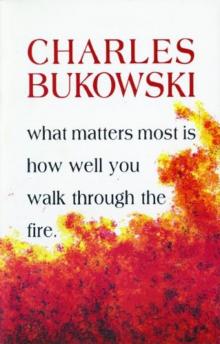 Burning in Water, Drowning in Flame
Burning in Water, Drowning in Flame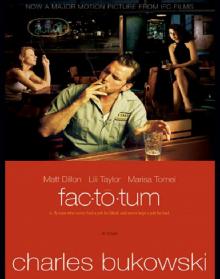 Factotum
Factotum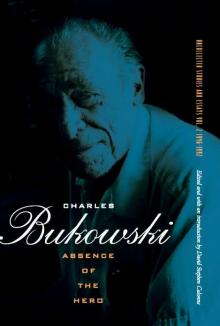 Absence of the Hero
Absence of the Hero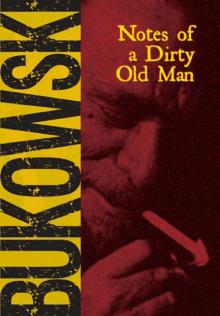 Notes of a Dirty Old Man
Notes of a Dirty Old Man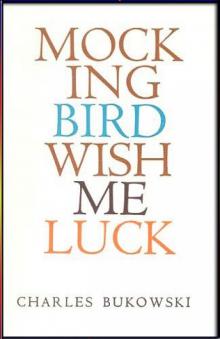 Mockingbird Wish Me Luck
Mockingbird Wish Me Luck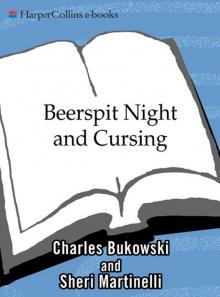 Beerspit Night and Cursing
Beerspit Night and Cursing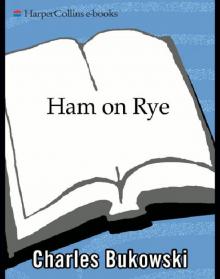 Ham on Rye: A Novel
Ham on Rye: A Novel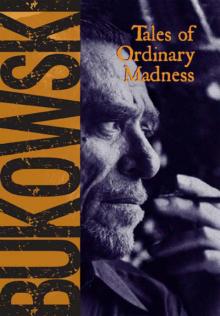 Tales of Ordinary Madness
Tales of Ordinary Madness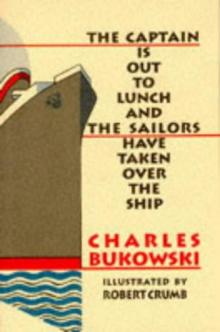 The Captain Is Out to Lunch and the Sailors Have Taken Over the Ship
The Captain Is Out to Lunch and the Sailors Have Taken Over the Ship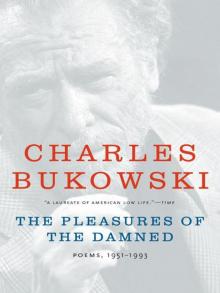 The Pleasures of the Damned
The Pleasures of the Damned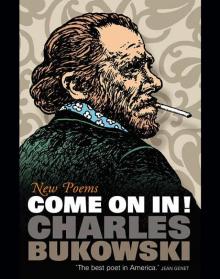 Come on In!
Come on In!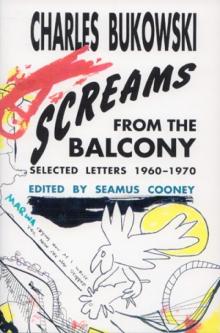 Screams From the Balcony
Screams From the Balcony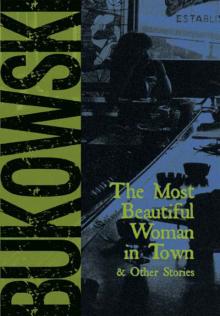 The Most Beautiful Woman in Town & Other Stories
The Most Beautiful Woman in Town & Other Stories New Poems Book 3
New Poems Book 3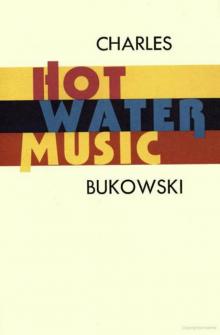 Hot Water Music
Hot Water Music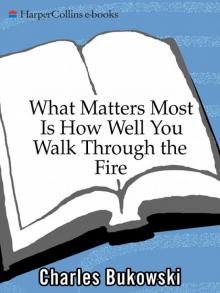 What Matters Most Is How Well You Walk Through the Fire
What Matters Most Is How Well You Walk Through the Fire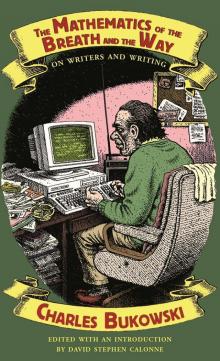 The Mathematics of the Breath and the Way
The Mathematics of the Breath and the Way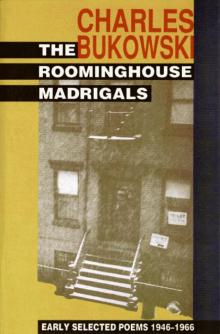 The Roominghouse Madrigals: Early Selected Poems, 1946-1966
The Roominghouse Madrigals: Early Selected Poems, 1946-1966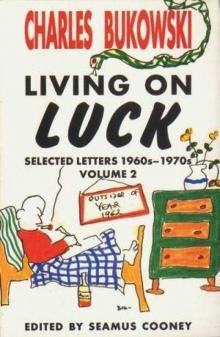 Living on Luck
Living on Luck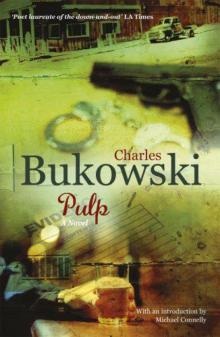 Pulp
Pulp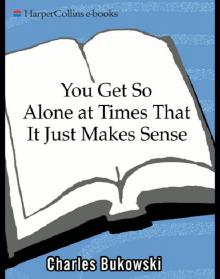 You Get So Alone at Times That It Just Makes Sense
You Get So Alone at Times That It Just Makes Sense Post Office: A Novel
Post Office: A Novel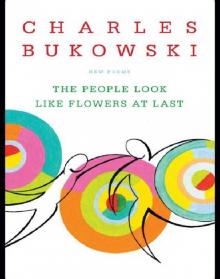 The People Look Like Flowers at Last: New Poems
The People Look Like Flowers at Last: New Poems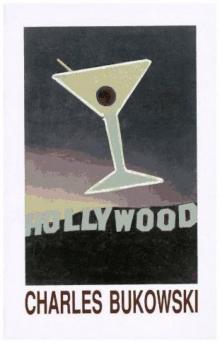 Hollywood
Hollywood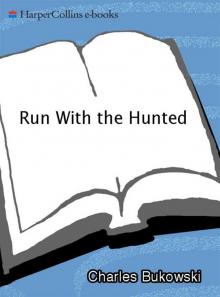 Run With the Hunted: A Charles Bukowski Reader
Run With the Hunted: A Charles Bukowski Reader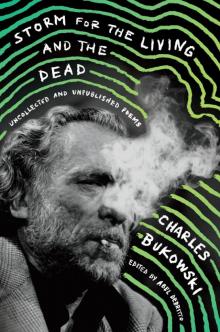 Storm for the Living and the Dead
Storm for the Living and the Dead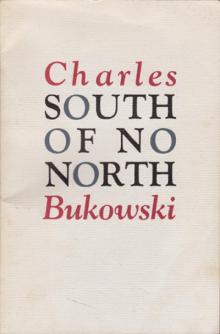 South of No North
South of No North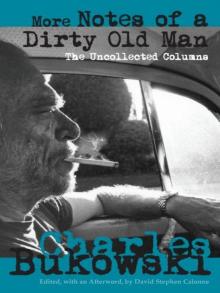 More Notes of a Dirty Old Man: The Uncollected Columns
More Notes of a Dirty Old Man: The Uncollected Columns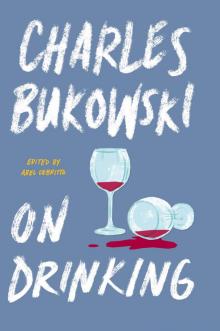 On Drinking
On Drinking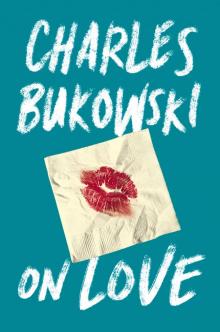 On Love
On Love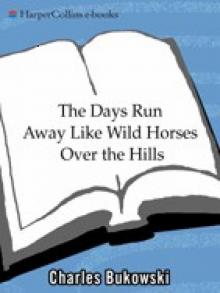 The Days Run Away Like Wild Horses
The Days Run Away Like Wild Horses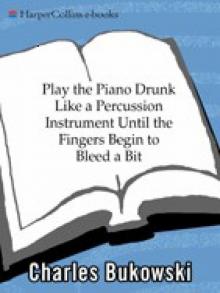 Play the Piano
Play the Piano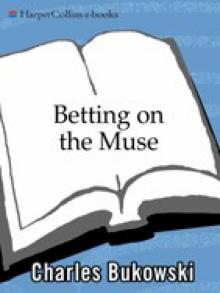 Betting on the Muse
Betting on the Muse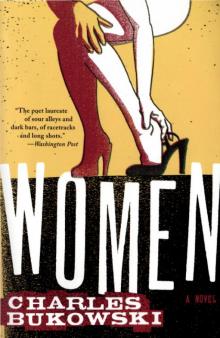 Women
Women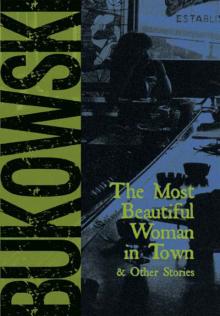 The Most Beautiful Woman in Town
The Most Beautiful Woman in Town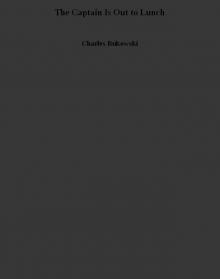 The Captain Is Out to Lunch
The Captain Is Out to Lunch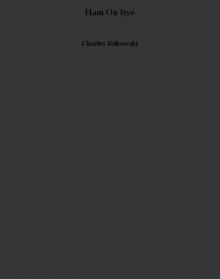 Ham On Rye
Ham On Rye New Poems Book Three
New Poems Book Three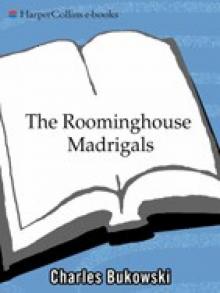 The Roominghouse Madrigals
The Roominghouse Madrigals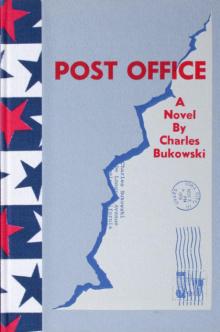 Post Office
Post Office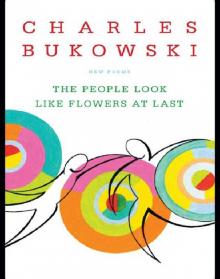 The People Look Like Flowers At Last
The People Look Like Flowers At Last